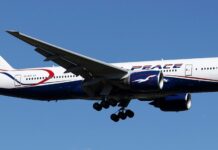The Nigerian Civil Aviation Authority (NCAA) and Lufthansa Airlines have pledged to ensure aviation sustainability, with the NCAA domesticating ICAO Annex 16 and Lufthansa’s participation in Carbon Offsetting and Reduction Scheme for International Aviation (CORSIA) and sustainable aviation fuel initiatives.
The two parties made the commitment at the Exclusive Discourse Event organised by Lufthansa Airlines in Lagos. The director of air transport regulations at the Nigerian Civil Aviation Authority (NCAA) Mrs Olayinka Babaoye-Iriobe, stated that the Authority is empowered by the Civil Aviation Act, 2022 to regulate environmental issues and further to reiterate its commitments to the sustainability of the industry, NCAA has domesticated ICAO Annex 16 on Environmental Protection into the National regulations under Part 16 of Nig. CARS which covers requirements for monitoring, reporting, and verification of CO2 Emissions for international aviation, and Part 5 addresses aircraft noise and emission certification.
Babaoye-Iriobe who was represented by the deputy general manager, (commercial agreement and aviation environment, Mrs Evelyn Tanko,) disclosed some of the initiatives of the NCAA on the sustainability of the industry.
The initiatives include the development of a State Action Plan on CO2 Emission reduction from international aviation, Nigeria voluntarily joined the Carbon Offsetting and Reduction Scheme for International Aviation (CORSIA) during its pilot phase in 2018 and has continued to ensure the timely submission of CO2 emission data from airlines under CORSIA and also leading on a Sustainable Aviation Fuels (SAF) Roadmap for the development and deployment of SAF in Nigeria.
She also said the Federal Airports Authority of Nigeria (FAAN) was rolling out Airport Carbon Accreditation (ACA) at major airports ultimately to reduce their carbon emissions.
Similarly, she said the Nigerian Airspace Management Agency, (NAMA) had implemented Free Route Airspace (FRA) and Performance-Based Navigation (PBN) all efforts for the reduction of carbon footprints and towards the sustainability of the industry.
She identified the key challenges in implementing and scaling sustainability policies within the aviation sector to include fragmented policy environment, limited data and monitoring systems, financing constraints, regulatory and institutional capacity, and awareness, and industry readiness.
Also speaking at the panel session, the senior director (sales), Lufthansa Sub-Sahara Africa, Mr. Rene Koinzack said the airline has deployed Science- Based Target Initiatives (SBTI) which comprises modern fleet, efficient flight operations, carbon neutral flying, sustainable aviation fuel, and reduction of waste and plastics as part of their effort to sustain the industry.
The panel emphasised the need for airlines, airports, aircraft manufacturers, and regulators to all play their roles to promote eco-friendly practices by lowering carbon emissions, improve fuel efficiency, develop alternative energy sources, and enhance operational efficiency for the sustainability of aviation industry.



























































